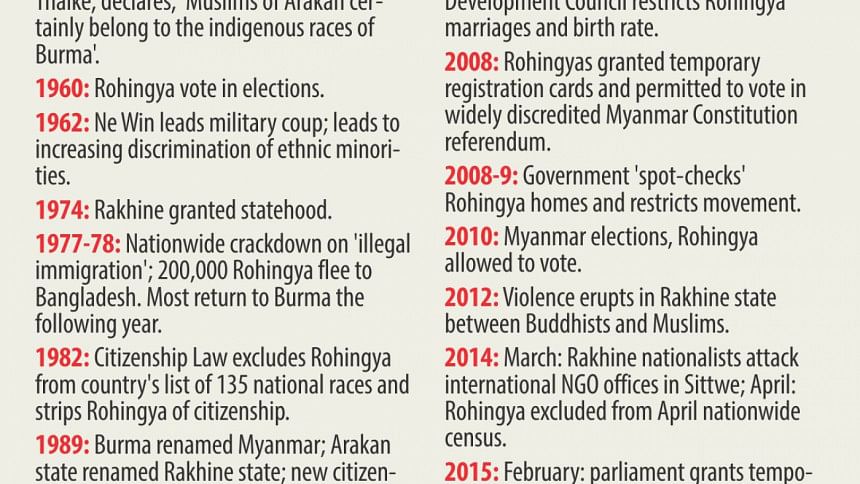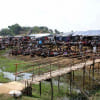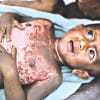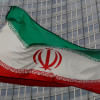Too little, too late
Although it came quite late in the series of events, the UN Security Council statement Wednesday just reminded the world how terrible is the nature of persecution and massacre of the Rohingya. So grave is the matter now that even China and Russia which in the past had blocked several UN resolutions since 2007 including the one mooted in March this year did not object to Wednesday's censure.
After the statement, British UN Ambassador Matthew Rycroft said it was the first time in nine years the council had agreed to a statement on Myanmar.
This is probably because the world has this time been totally convinced of what the International State Crime Initiative (ISCI), had concluded in its 2015 report that "the Rohingya faces the final stages of genocide".
The ISCI, a highly respected community of scholars working to expose, document, explain and resist state crimes, is based at Queen Mary University of London. Its other partners are University of Hull, University of Ulster and Harvard Humanitarian Initiative. Eminent linguist, historian and philosopher Noam Chomsky is one of its honorary fellows.
Nevertheless, its report said to be the most systematic study on the treatment of the Rohingya had gone largely unnoticed or been ignored by the international community. Otherwise the world would not have waited for 2017. And the ongoing murders and rapes of the Rohingya could perhaps be avoided.
While doing the study, ISCI had found that of the six stages of genocide -- stigmatization; harassment, violence and terror; isolation and segregation; and systematic weakening of the Rohingya -- had been completed in Myanmar by 2015. The final two -- mass annihilation and finally symbolic enactment involving the removal of the victim group from the collective history -- is now being staged in the Rakhine State.
The ISCI also documented how these genocide processes have been orchestrated at the highest levels of state and local Rakhine government. The actions were led by state officials, Rakhine politicians, Buddhist monks and Rakhine civil society activists.
"The State's persistent and intensified 'othering' of the Rohingya as outsiders, illegal Bengali immigrants and potential terrorists has given a green light to Rakhine nationalists and Islamophobic monks to orchestrate invidious campaigns of race and religious hatred reminiscent of those witnessed in Germany in the 1930s and Rwanda in the early 1990s," the report said.
ISCI discovered a leaked document apparently adopted by the Myanmar regime in 1988 which reveals the country's State Peace and Development Council's commitment to eliminating the Rohingya from Myanmar.

These include reducing the population growth of the Rohingyas by gradual imposition of restrictions on their marriages and by application of all possible methods of oppression and suppression against them, denying them higher studies, government jobs, ownership of lands, shops and buildings.
The council's plan is literally to stop all their economic activities and secretly convert the Muslims into Buddhists.
ISCI also showed how the Arakan National Party (ANP), the majority Buddhist political party in Rakhine, has adopted Nazi ideology in its documents. ANP mouthpiece magazine The Progress in its November 2012 editorial after the June violence on the Rohingya wrote: "Hitler and Eichmann were the enemy of the Jews, but were probably heroes to the Germans…In order for a country's survival, the survival of a race, or in defense of national sovereignty, crimes against humanity or in-human acts may justifiably be committed as Hitler and the Holocaust... If that survival principle or justification is applied or permitted equally [in our Myanmar case] our endeavors to protect our Rakhine race and defend the sovereignty and longevity of the Union of Myanmar cannot be labelled as "crimes against humanity", or "inhuman" or "in-humane". ... We no longer wish to hold permanent concerns about the Bengali in our midst. We just want to get it over and done with, once and for all."
This policy continued in bits and pieces until the actions escalated in October last year and again this time in 2017 that has successfully reduced the Rohingya population by half in Myanmar.
Wednesday's UN move, although too late for the genocide to be avoided, is still a flicker of hope for a people left without a land. A people who "are not alive or dead".
If the world treats this ISCI report more seriously, the UN should move more determinedly with robust actions, including investigations into crimes against humanity and sanctions.
It is after all the UN Special Rapporteur on human rights in Myanmar, Tomas Ojea Quintana, himself agreed with the observations of the report and said "the International State Crime Initiative arrives at a convincing conclusion" that a process of genocide against the Rohingya population is underway in Myanmar."
Now that the UN human rights chief has termed the situation "a textbook case of ethnic cleansing" the demand for more actions can be heard louder.

 For all latest news, follow The Daily Star's Google News channel.
For all latest news, follow The Daily Star's Google News channel. 








Comments